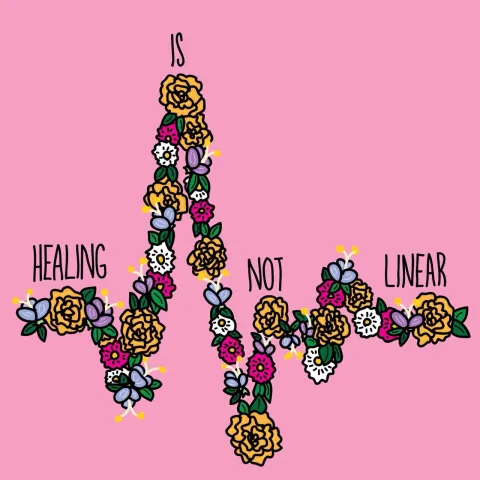Recovery & Healing
Sexual assault/sexual violence can impact you on many levels and you may experience a wide range of feelings. There is no right or wrong way for you to feel or react.

Healing Is Not Linear: http://thefrizzkid.tumblr.com
Healing from Trauma
Sexual assault/sexual violence is a traumatic experience that can impact you on many levels: academic, work, psychological, physical, social and emotional.
You may experience a wide range of feelings such as shock, fear, disbelief, recurring memories, outrage, confusion, sadness, despair, and anger. There is no right or wrong way for you to feel or react. All of your feelings are valid.
What can you do?
Get emotional support.
Talk to a counsellor, call a distress line or get peer-to-peer support. The Sexual Violence Prevention Coordinator can make a referral for you to receive counselling and provide links to resources available to you both on and off-campus.
Practice self-care.
How can you nourish yourself? Healing is a process, so try to be patient. If you can find time for self-care, it will help in your healing. There are free, online resources that you can access for more self-care information and activities.
- Healing, Pleasure, and Sex After Trauma Resources
- Choosing Your Own Path of Survivorship
- Youth Surviving and Thriving. Many Paths to Healing
- PDF filePDF fileCaring for Yourself is a Radical Act
- PDF filePDF fileMethods of Self Care
- 4 Ways to Overcome Self-Blame After Sexual Assault
- Women's College Hospital Self Care Package
Have your voice heard.
Speaking out about sexual violence and rape culture can be an empowering moment for some survivors if and when you are ready. Alternatively, you may choose to tell no one, tell only yourself, share your story in your self-help group, or confide in trusted friends or family. Anything you choose to survive is powerful and is your choice.
There are ways to take action on campus through group programming, advisories, workshops and events. Learn more at our Take Action Page.
Trauma
Trauma can show up differently in everyone. It can be subtle and unexpected, or blatant and impossible to ignore. If you’ve experienced an assault you might be wondering what’s “normal” following an assault or concerned that you are going to be “messed up” or “damaged” in some way. The reality is that people who’ve experienced sexual violence can and do heal and go on to live healthy, fulfilling lives. Anything and everything is normal following an assault and there is no right or wrong way to cope.
Some of these are common responses from trauma:
- Disrupted sleep patterns
- An inability to concentrate or focus
- Fear of leaving a safe space
- Anxiety and/or depression
- Appear flat or calm
- Headaches
Each one of these reactions is normal to a traumatic event. There is not a right or wrong way to act when telling one's story of sexual violence. That's why it is so important to show support to all acts of disclosure of sexual violence or any other acts of violence.
Lots of things determine how you react including your usual coping strategies, personal history, and the response you get from others. Be attentive to yourself, and don’t hesitate to get help if you notice you really aren’t doing well, have questions about how you are coping, or if you notice your becoming depressed or suicidal. Some common reactions include thoughts of disbelief, powerlessness, and other emotions such as numbness, rage, guilt and self-blame. While these can be very scary, know they are a normal part of healing and are your body’s way of processing what happened. There are a lot of different strategies to help manage them and you can contact Counselling Services or Lethbridge Family Services to meet with a counsellor to learn more.
Below is a video and a website that can help explain what trauma looks like in our brains and bodies, and how this can affect our everyday lives.
- Emotional and Psychological Trauma, external link: Healing from Trauma and Moving On (Help guide). Tips on how to dealing with traumatic events, both first-hand and vicariously.
